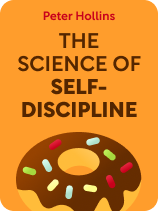

This article is an excerpt from the Shortform book guide to "The Science of Self-Discipline" by Peter Hollins. Shortform has the world's best summaries and analyses of books you should be reading.
Like this article? Sign up for a free trial here.
Do you know how to resist temptations? What type of people bring out the best in you?
Although it’s important to have a strong foundation for discipline in your mind and behaviors, your environment plays a large role in your success. If you’re constantly surrounded by unhealthy temptations, your discipline will be more likely to waver.
Let’s discuss the importance of surrounding yourself with discipline in your environment and relationships.
Build an Environment That Encourages Discipline
If you’re constantly having to grapple with temptations that draw you away from the things you need to be doing, you’ll eventually exhaust your willpower and give in. So, Peter Hollins’s advice on how to resist temptations is to construct an environment that supports discipline instead. One way to do this is to remove distractions that tempt you throughout your day. For example, if you work from home and you’re tempted to do unnecessary house chores whenever your work presents an uncomfortable challenge, try working from a coffee shop, library, or any place that removes you from your home’s temptations.
(Shortform note: Sometimes the greatest distractions you face aren’t just the places you are, but the people you surround yourself with. If you’re always tempted to engage with people around you or your work colleagues ask for your attention a little too often, try setting boundaries. Wearing headphones when you need to do some deep work can keep you from overhearing enticing conversations you’ll want to join and indicate to others that you’re focused on your work. You can also close your door if you have your own office or put up a “do not disturb” sign. If unspoken signals aren’t enough, you can communicate with family or colleagues about sections of the day when you’d like to be left undisturbed.)
Hollins says you can also take advantage of your cravings for dopamine by rewarding yourself for completing tasks related to your goal. For example, if you finish writing a chapter of your book, you can treat yourself to a coffee. By doing this, you’ll condition yourself to associate challenging tasks with rewards.
(Shortform note: Experts say rewards can derail our healthy habits if we don’t use them wisely. For instance, rewards are dangerous because they might signal to you that you’ve completed a goal and thus can slack off. Rewards can also threaten to break your habits if they’re overly indulgent and involve behaviors you’re trying to avoid. One expert says the best rewards to give yourself are those that support your healthy habits. For example, if you fulfill a writing goal, reward yourself with a new journal to write in.)
Build Relationships That Promote Discipline
Hollins explains that along with your physical surroundings, your relationships have a significant effect on your discipline. So, it’s important not to be around people who slack off and indulge in unhealthy behaviors. This can rub off on you. Instead, find an accountability partner. This is someone who encourages you to maintain your discipline, who celebrates your successes, and whom you don’t want to disappoint if you slack off.
(Shortform note: According to The Success Principles, a good accountability partnership involves a commitment to each other’s success, not just your own. This means motivating each other to stay on track toward your goals, meeting regularly to check in on progress, and looking out for opportunities that may support each other’s success.)
Hollins also suggests you take advantage of the Hawthorne Effect to maintain discipline. The Hawthorne Effect is the idea that knowing people are watching you makes you perform tasks more effectively. You can implement this idea by regularly posting some of your routine tasks on social media. For example, Navy SEAL Jocko Willink takes a picture of his watch and posts it to Instagram when he gets up to work out every morning at 4:30 a.m. If you work remotely and struggle to stay on task, work at a coffee shop, a library, or with a friend who also works remotely.
(Shortform note: The Hawthorne Effect can have a positive as well as a negative influence on motivation. One study observed that medical patients sometimes overestimate their pain or experience more intense symptoms in the presence of medical attention. Amplified patient responses can be caused by a variety of factors, including conformism, a desire for special attention, or a fear of not being taken seriously. The study concluded that it’s important for medical practitioners to use neutral language around their patients to encourage normal, calm impressions of their treatments. To put this finding into practice, surround yourself with people who you trust to give you level, honest feedback and healthy amounts of attention.)
Finally, writes Hollins, find a positive mentor. Identify and connect with someone who inspires you to be disciplined toward your goals. For example, this could be someone who’s already had success in the area of the goal you’re pursuing. Learn from their approach and apply what you can to your own.
(Shortform note: One expert says a key to identifying a good mentor is whether the relationship feels natural. To test the waters with a potential mentor, arrange a casual meeting and present them with a question or problem you’d like to hear their advice on. If they listen to you carefully and you seem to have good chemistry together, there may be a good mentorship in the making!)

———End of Preview———
Like what you just read? Read the rest of the world's best book summary and analysis of Peter Hollins's "The Science of Self-Discipline" at Shortform.
Here's what you'll find in our full The Science of Self-Discipline summary:
- Why changing habits takes far more than creating a routine
- Science-based habits and strategies for maintaining discipline
- How perfectionism holds us back from risk and success






